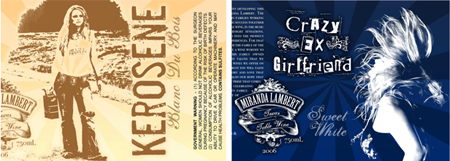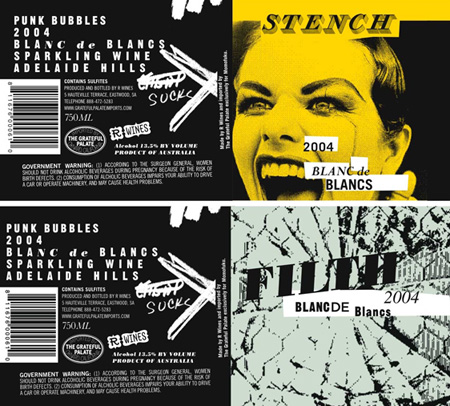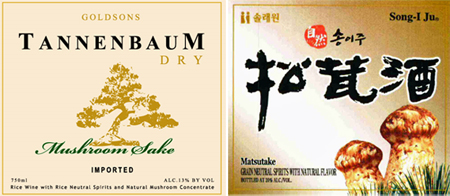We don’t know much about Miranda Lambert, but we liked the looks of these labels. The graphic designer did a nice job of making them visually interesting, in our opinion. These Texas table wines would not be nearly as tantalizing without this impressive culmination of fonts, word choices, and graphics. This article says the singer is actively involved in running the winery, and it shows. She’s pretty busy for a 24 year old, with a winery and various Grammy Award nominations, and this e-commerce site for wines. She is nominated for Female Vocalist of the Year and performing on the CMA Awards in two days on ABC. On the technical side, the Kerosene COLA shows that TTB requires a bit more space around the Government Warning.
Tomato Wine
Fred Franzia likes to say he can make good wine from grapes grown just about anywhere. These two labels tend to show he could also make wine from just about anything. This tomato wine seems to decide the age-old question of whether a tomato is a fruit or a vegetable. TTB classified it as a “table fruit wine” and the winery itself says it’s made with “only the finest fruits available … ” Along the same lines, here is an avocado wine, vinted and bottled in Florida. TTB classified it as a “table fruit wine.”
How Evil is Your Brew?
It’s 2008. Table wine is still evil? Apparently so. Just like there are a shocking number of dog and lizard labels, the TTB database also reveals a humongous number of labels overflowing with “evil” and “sin.” They are virtually in a sumo match for who can be most evil. It’s tough to top a skull and crossbones, as in the Irish Death Ale label above. But then, it makes no claim to be pure in its evil ways, and so the Grateful Palate rises to the occasion yet again to bring us unmitigated, Pure Evil. It is a South Australia Chardonnay that is “Perfectly wrong.”
Punk Bubbles: Do You Prefer the 2004 Stench, or Filth?
Large is the number of alcohol beverages with a reputation for elegance and exclusivity polished to a fine sheen. An example is Armand de Brignac Champagne. But in a burst of contrarian marketing, The Grateful Palate is running full speed in the opposite direction. Stench and Filth are Australian sparkling wines, recently approved. They are part of a Punk Bubbles line of sparkling wines. The line also includes Cheated, Vacant (For Humans) and No Future. Should we look forward to the 2005 Sewage?
1792 Ridgemont Reserve
TTB frequently says vintage dates are not allowed on spirits. The rationale is: subtle vintage characteristics do not survive distillation, and it is usually misleading to suggest otherwise. This bourbon label shows a prominent date, but seems to refrain from using the “vintage” term. The back label explains that 1792 is the year when Kentucky became the 15th state. The ad is from the October 24, 2008 Wall Street Journal.
The Mighty Mushroom
Just when we got accustomed to mushrooms in the entree, two companies in Korea went and added mushrooms to the beverage. Tannenbaum “Mushroom Sake” is Rice Wine with Rice Neutral Spirits and Mushroom. Song-I Ju is Grain Neutral Spirits with Natural Matsutake Mushroom Flavor.







